Vladimir Putin’s 17 years in power: The scorecard
Alex Krainer The Naked Hedgie

Today, October 7, 2017, Russia celebrates the 65th birthday of Vladimir Vladimirovich Putin. To mark the occasion, we are posting Alex Krainer’s review of Putin’s achievements since 2000.
Mr. Putin can’t seem to get a break in the western media. I watched his recent interview with CBS’s Megyn Kelly with her tiresome, boring questions like, “did Russia interfere in our election,” “did your ambassador meet with Trump’s election officials,” “isn’t it true that you’re a corrupt murderous thug,” etc.
Only in response to Kelly’s last question did Mr. Putin get to name a handful of his achievements in Russia. But someone ought to better prepare his talking points on this score. The excerpt below from my upcoming book summarizes how Russia has changed during the 17 years since Mr. Putin has been at the helm.
On 26th July 2014 British magazine “The Economist” published an article titled “A web of lies,” opening with the following two sentences:
In 1991, when Soviet Communism collapsed, it seemed as if the Russian people might at last have the chance to become citizens of a normal Western democracy. Vladimir Putin’s disastrous contribution to Russia’s history has been to set his country on a different path.
Well, we have already seen how Russia fared in the 1990s after Soviet communism collapsed. For some reason, the bright minds at The Economist thought this path was so promising, it was a real shame – a disaster, no less – that Vladimir Putin took Russia on a different one. Let’s take a closer look at Mr. Putin’s “disastrous contribution.”
To start with, Putin played the pivotal role in keeping the country from disintegrating. When he came to power, Russia’s regional governors were writing their own laws, disregarded presidential instructions and were not even returning their republics’ tax receipts to the Federation’s purse. Mikhail Gorbachev stated that Putin
saved Russia from the beginning of a collapse. A lot of the regions did not recognize our constitution [1]
But this historical feat was only the starting point of the subsequent renaissance of the nation. Its economy returned to growth and became more vibrant and diverse than it had been perhaps since the reforms of Pyotr Stolypin of the early 1900s.
Economic reforms
In 2000, Russia was one of the most corrupt countries in the world. Without instituting draconian purges, Putin took on the oligarchs and steadily curtailed their power, gradually returning Russia to the rule of law.
By 2016, his government had reduced corruption to about the same level as that of the United States. That was the empirical result of the annual study on corruption published in 2016 by Ernst & Young.[2]
The global auditing consultancy asked respondents around the world whether in their experience, corruption is widespread in the business sector. Their survey, which was conducted in 2014, indicated that only 34% of their Russian respondents thought so, the same proportion as in the United States, and below the world average of 39%.
Things have probably improved further since then as Vladimir Putin stepped up a high-profile anti-corruption campaign that led to investigations and prosecution of a number of high level politicians around Russia. Even highly ranked members of Putin’s own political party were not spared.[3]
The unmistakable message of such campaigns was that corruption would not be tolerated and that it would be aggressively investigated and prosecuted. Some of the best evidence that Putin’s various anti-corruption measures have had effect can be found in World Bank’s Enterprise Surveys which ask businessmen the question, “was a gift or informal payment expected or requested during a meeting with tax officials?”
In 2005, nearly 60% of respondents answered affirmatively. By 2009 this number was 17.4% and by 2012 it had dropped to only 7.3%.
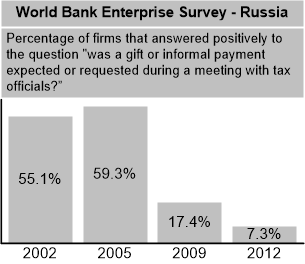
Putin’s government also made impressive advances in making it easier for entrepreneurs and small businesses to set up shop, raise capital and operate in Russia. According to World Bank’s annual “Doing Business” report, which ranks 190 world economies on a set of attributes such as the ease of starting a business, obtaining construction permits, obtaining electricity, raising credit, and enforcing contracts, on all the metrics combined, Russia managed to climb from 124th place in the world in 2012 to 40th in 2017.[4]
Thus, within only five years, Russia had vaulted an impressive 84 positions in World Bank’s ranking. This was not a random achievement but the result of President Putin’s explicit 2012 directive that by 2018 Russia should be among the top 20 nations in the world for ease of doing business.
One of the strategically important sectors where Russia has made striking progress is its agricultural industry. After the disastrous 1990s, when she found herself dependent on food imports, Russia again became self-sufficient in food production and a net food exporter.
By 2014, Russian exports of agricultural products reached nearly $20 billion, almost a full third of her revenues from oil and gas exports.
Not only is Russia now producing abundant food for its own needs, the government is explicitly favoring production of healthy foods, a strategy which includes a ban on the cultivation of genetically modified (GMO) crops, introduced by the State Duma in February of 2014. According to official Russian statistics, the share of GMO foods sold in Russia declined from 12% in 2004 to just 0.1% by 2014.
These and many other constructive reforms have had a very substantial impact on Russia’s economic aggregates as the following examples show:
- Between 1999 and 2013, Russia’s gross domestic product (GDP) leaped nearly 12-fold from $1,330 per capita to more than $15,560 in 2013, outpacing even China’s remarkable economic growth.
- Russia reduced its debt as a percentage of GDP by over 90%, from 144% in 1998 to less than 14% in 2015!
- Gross national income per capita rose from $1,710 in 2000 to $14,810 in 2013.
- Unemployment fell from 13% in 1999 to below 5% in 2014. Among the working population (those aged 15-64), 69% have a paid job (74% of men).
- Only 0.2% of Russians work very long hours, compared to 13% OECD average.
- Poverty rate fell from 40% in the 1990s to 12.5% in 2013 – better than U.S. or German poverty rates (15.6% and 15.7%, respectively)
- Average monthly income rose from around 1,500 rubles in 1999 to nearly 30,000 rubles in 2013.
- Average monthly pensions rose from less than 500 rubles to 10,000 rubles.
Social and demographic improvements
Putin’s economic reforms included also a more equitable distribution of wealth. As hopelessness faded and standard of living improved, Russian society started to heal: suicides, homicides, and alcohol poisonings declined dramatically. Over the twenty-year period between 1994 and 2014, suicides declined by 56%, homicide rate by 73%, and alcohol poisonings by 83%!

The chart below shows the evolution of these improvements over time:
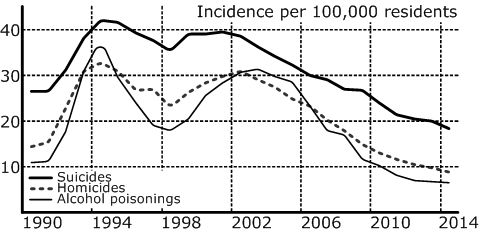
As we can see, these misery statistics rapidly deteriorated with the introduction of shock therapy in 1992, but the trend sharply reversed soon after Putin took charge. By 2014, these figures reached their lowest values since even before 1992. Along with these improvements, the nation’s demographic trends also experienced a dramatic turnaround.
Russian life expectancy, which sunk to an average of barely 64 years (57 for men), rose steadily from the early 2000s to reach almost 72 in 2016, the highest it has ever been in Russia’s history.
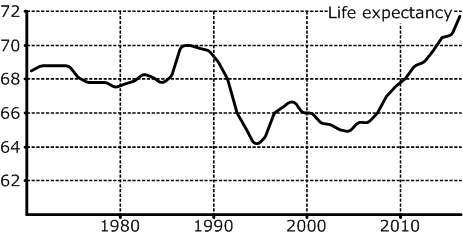
Looking at the way life expectancy in Russia changed over time, we see again that it had collapsed in the early 1990s but the trend turned around sharply under Vladimir Putin’s leadership of the country. Similarly, fertility rate, which dropped to 1.16 babies per woman in 1999, increased by almost 50% to 1.7 babies by 2012, comparing favorably to European Union’s average of 1.55 babies per woman of childbearing age. Abortions declined 88% from a harrowing 250% of live births in 1993 to 31% in 2013.
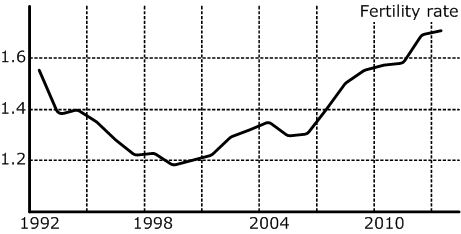
Not only are Russians living longer than ever before and enjoying much better quality of life, they also feel freer and happier. In 2014, Gallup Analytics reported that 65% of Russians, more than ever before, answered “Yes” when asked, “are you satisfied … with your freedom to choose what you do with your life?”
Meanwhile, Russia’s happiness index rose more than tenfold, from 6 in 1992 to 70 in 2015. Happiness index, compiled by VCIOM[5] adds the proportion of the respondents reporting that they feel decidedly happy or generally happy and deducts those that report feeling generally unhappy or decidedly unhappy.
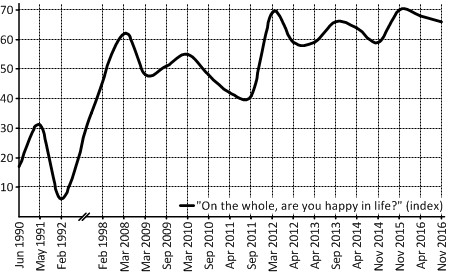
The next chart further corroborates the idea that under Putin’s leadership, Russia has been developing as a sane and prosperous society, not only for the benefit of a narrow ruling class and at everyone else’s expense, but for the vast majority of ordinary Russians.
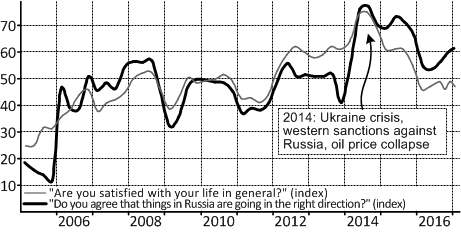
By 2014, the great majority of Russians felt satisfied with their lives and believed that things in Russia were moving in the right direction. These figures only tapered off after the 2014 western-sponsored coup in Ukraine and the subsequent economic sanctions imposed on Russia. At the same time, the price of oil – still one of Russia’s largest export – collapsed from over $100 per barrel to under $40.
Economic sanctions and the oil price collapse triggered a significant crisis in Russia’s economy.
However, in spite of the continuing sanctions regime imposed on the country, its economy started improving again in 2016, thanks to its diverse industrial base that includes a developed commercial and consumer automotive industry, advanced aircraft and helicopter construction based largely on domestic technologies, world’s leading aerospace industry building satellites and top class rocket engines, and advanced industries in pharmaceutical, food processing, optical device, machine tools, tractors, software and numerous other branches.
Indeed, Russia is far from being just the “Nigeria with missiles,” or a “gas station with an army,” as many western leaders like to characterize it.
Insofar as a population’s sentiment is a valid measure of its leadership’s performance, Russia’s development under Vladimir Putin stands in sharp contrast with the weak performance of most other developed nations, including those that most vehemently criticize Russia and its president.
According to polls conducted by Ipsos Public Affairs in 25 different countries in November 2016 and published by the World Economic Forum, almost two thirds of the people in the world believed that their countries were moving in the wrong direction. The leading western nations scored just as badly, while some among them did flat out dismally.
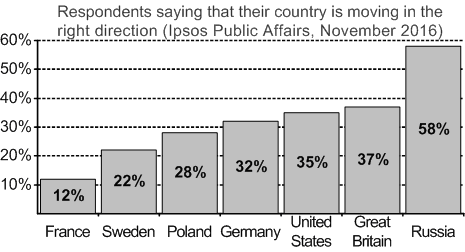
Evidently, Russians feel much better about the way their nation is shaping up than do constituents of many western nations[6] whose sanctimonious leaders like to lecture their Russian counterparts about prosperity, freedom, democracy and other exalted values they purport to cherish.[7]
It may thus only surprise the most credulous consumers of western propaganda that a high proportion of Russian people trust Vladimir Putin and approve his job performance. In the early 2017, Putin’s job approval stood between 80% and 90% and has averaged 74% over the eleven years from 2006. During this period, no western leader has come even close to measuring up with Vladimir Putin.
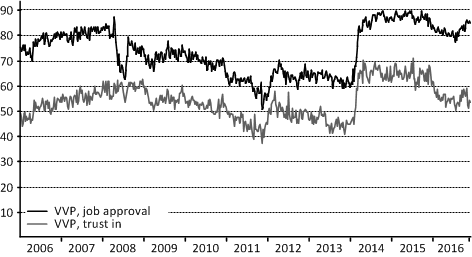
Over the years, I’ve heard depressingly many intellectuals attempt to dismiss Putin’s achievements and Russian people’s contentment as the product of Russian government propaganda. Putin the autocrat, you see, keeps such tight control over the media that he can deceive his people into believing that things in the country are much better than they really are.
But the idea that government propaganda can influence public opinion in this way is just silly. If the majority of people thought their lives were miserable, state propaganda could not persuade them that everything is great. On the contrary, most people would conclude that the media is deceiving them and might feel even less positive about things as a result.[8]
It is sillier still to think that western intellectuals should have a better appreciation of what it is like to live in Russia than the Russian people themselves. Rather than buying the truth from their media, such intellectuals would do well to take a trip and visit Russia, speak to ordinary people there, and reach their own conclusions. My own travels in Russia, as well as reports from other visitors largely agree with the positive picture that emerges from the statistics we’ve just examined.
Notes:
[1] (Gorbachev: Putin saved Russia from disintegration 2014)
[2] (Stulb 2016)
[3] Some of the names arrested in 2016 surprised even the Russian public as they included such high caliber individual as the Mayor of Vladivostok, Igor Pushkarev; Governor of the Kirov region, Nikita Belykh; Governor of the Sakhalin region, Alexander Khoroshavin, Deputy Minister of Culture Grigory Pirumov and Minister for Economic Development, Aleksey Ulyukaev.
[4] (Romer 2016)
[5] ВЦИОМ – Russian Center for Research on Public Opinion
[6] A different, Associated Press – GfK poll in July of 2016 uncovered an even darker public sentiment in the United States: “A stunning 79 percent of Americans now believe the country is heading in the wrong direction, a 15-point spike in the past year…” (J. Pace 2016)
[7] VCIOM’s figures for November 2016 are somewhat higher than those of Ipsos (62% vs. 58%).
[8] This, for instance, was the situation in the late 1990s when only 5 to 10 percent of Russians thought that the country was heading in the right direction in spite of the ruling elite’s nearly total control of the media.
Alex Krainer is an author and hedge fund manager based in Monaco. Recently he has published the book “Mastering Uncertainty in Commodities Trading“. The above article is an excerpt from his upcoming book (really, any day now…) whose working title is “The Killing of William Browder”.
SUPPORT OFFGUARDIAN
If you enjoy OffG's content, please help us make our monthly fund-raising goal and keep the site alive.
For other ways to donate, including direct-transfer bank details click HERE.




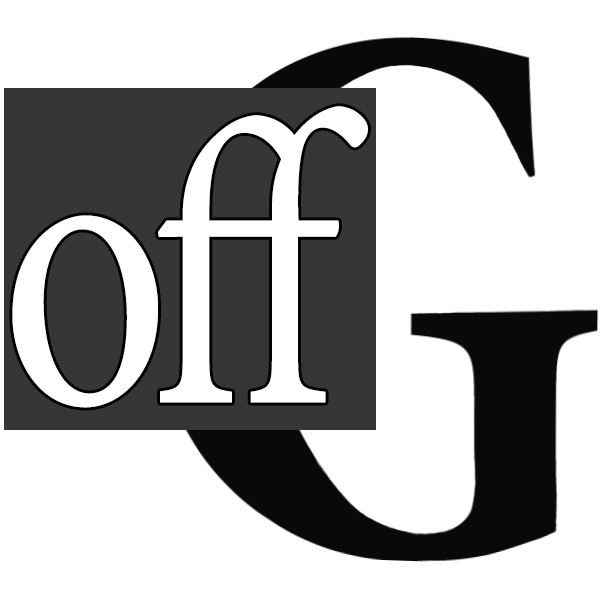
Reblogged this on Worldtruth and commented:
Yet another fine article exposing the lies and corruption of the Western Mainstream Media and their political masters.
It shouldn’t come as any surprise that the image of Russia created in the western MSM is, shall we say, somewhat out of kilter with the reality (British understatement!). But this is to be expected. There is, after all, a war going on. Russia and China are blocking the Anglo-Zionist’s increasingly desperate attempts to create a subservient World Empire – moreover adding insult to injury the two Eurasian powers are in the process of creating there own Eurasian political/economic/political bloc – and the frustration at this turn of events has become manifest in the western media. Thus the ongoing demonization of Putin in particular and Russia in general. Putin is of course unspeakably bad, a bad man, in a bad country, ruling over bad people; this is the view of the West’s MSM. Comic book stuff really from the West’s Ministry of Truth. And even if it were true it… Read more »
So funny watching the excitement in the Western Main Stream Media over a few hundred people arrested out of some hundreds protesting in Russia against Putin this week. You’d think there were hundreds of thousands the way the media drooled over the video. I mean it’s not as if our Western media have any bias against Russia, is it?
Which should ANYONE be arrested for taking part peacefully in a political protest?
When an unlawful demonstration happens in a place where it disturbs traffic and people, it is natural that the demonstrators be arrested.
All public gatherings require authorisation, as happens in any large town or city in any country. The organisers deliberately ignore the requirements preciesley so they can manufacture a protest when they get arrested. Nowhere is there any assessment in the MSM (that I can find) about whether the protests were significant. There are millions of people in Moscow elegible to vote so a few hundred is clearly insignificant. More people turn out for festivals, football matches, and pop concerts. The covereage in the MSM was manufactured bollocks designed to ruin Putin’s birthday. Its just pathetetic. For the record, Navalny is just as much a crook as most Russian politicians.
@ChristopherBarclay
They were not arrested for demonstrating, unlike demonstrators in the UK marching peacefully. They were arrested because of WHERE and how they were demonstrating, putting not only their own lives at risk but that of others. Same thing happened in my town in Cambs with many arrests being made(it too was peaceful until the police started arresting the demonstrators). But let me guess – “that’s different” eh?
The 1% despise/fear any nation/leader that makes an effort to address social injustice (Putin, Castro, Gaddafi).
Proof positive that the ruling class are socio/psychopathic by nature.
I doubt Putin would want to be associated with a man who drove his country’s economy into the ground (Castro) or a tyrant who wasted his country’s natural resources (Gaddafi). If you had read the article, you would have learnt that Putin has encouraged private investment in order to diversify the economy and has forced state bodies such as the tax authorities and regional governments to respect the rule of law.
@Christopher Barcland and if you knew anything of any worth or could actually recount the truth, you would know the lie of your words regarding Gaddafi’s and the many superior (to Britain and many other countries in the west) improvements he made to his people’s country and how the resources – which he designated belonged to the people(as in Iran and Syria)were being offered to Russia for investment within the pipeline agreement(hence the reason he had to go – just like Assad and Hussain) and were NOT squandered at all. And in case you do not understand the nature of private investment whereby funding is provided which the people’s taxes cannot secure, the funding was for the purposes of strengthening the country’s future and economy in the interests of the people of Libya rather than the corrupt pilfering and asset grab the US and western trade agreements were demanding. If… Read more »
Good to see a well-researched article with some verifiable facts in it. Contrasts well with the typical Western corporate media.
“Russia reduced its debt as a percentage of GDP by over 90%, from 144% in 1998 to less than 14% in 2015!”
Yeah, by going bankrupt! I don’t suppose Russian savers really saw the Russian Banking Crisis as a positive event: as their wealth was wiped out by the devaluation of the Ruble? Still, as it was in the Yeltsin era, and oil prices played a large part – it was no reflection on Vladimir Putin. So I was intrigued as to why it is claimed as one of his achievements??? Paying off the IMF bailout package early and managing the economy without their ‘help’ – now that’s an achievement.
For the hard of thinking that (I presume) downvoted me for an alleged derogatory comment: perhaps a little mansplainin’ is required? The Russian Federation inherited the entire debt of the former Soviet Union. Not a good start. The Yeltsin era was a carnival of speculative credit creation. ruble printing, and an orgy of privatisation. This gutted the productive economy – leaving it overly dependent on oil revenues (Dutch Disease); and borrowing (domestic and foreign {including the IMF}) to fund the deficit. After a couple of external shocks – the Asia Financial Crisis (Soros); and a fall in oil and metal prices – the (deliberately) weakened economy began to falter. There was a speculative attack on the ruble (Soros?). To prevent a run, the Central Bank of Russia was forced to use its $$$ (Forex reserves) and bullion. Amid the bursting speculative debt bubble; the the hyper-inflation of the collapsing ruble;… Read more »
@BigB. That’s much better. How many other Russian politicians could have done what Putin has done(regardless of ethics, which seems to be an intrinsic element anyway)in securing investment and contracts and enabling the petro dollar crash(by rescuing Syria and affirming friendship with Iran, China and Turkey)and to get on side countries that could bypass the US and EU domination of the global petrol orientated markets? He has been jetting all over the world securing Russia’s financial future with the pipelines and OBOR and successfully effecting changes in market trends devoted to US and OPEC oil. THAT is why the US is so desperate to wage economic and propaganda war against Russia and Putin in particular. To say his tenacious and charismatic diplomacy cannot be attributed to what he has achieved and ascribe it to “somebody else’s influence” is rather akin to missing the whole point of why the US and… Read more »
Hi Susan: “To say his tenacious and charismatic diplomacy cannot be attributed to what he has achieved and ascribe it to “somebody else’s influence”…”. Did I say that? I merely pointed out that he didn’t reduce the debt to GDP ratio by 90% as claimed. There were other factors: which make the authors claims disingenuous. Even to this day, despite diversification, Russian GDP tracks the price of oil – which is natural for a hydrocarbon superpower. He’s good, but he’s not that good. If the price of oil had remained low in the noughties: there would have been nothing he could do. Going forward, compared to the debt zombies of the West (excluding Germany); there is no doubt the Russian economy is in good shape under Putin – not despite of sanctions, because of them (as this report from the Duran details). He is a great statesman, a shrewd and… Read more »
“Abortions declined 88% from a harrowing 250% of live births in 1993 to 31% in 2013.”
Impressive list of facts, but…with respect to live births, 100% would be all of them. So please explain how abortions declined from 250%??
Awkward phrasing, but the meaning is clear: whereas abortions outnumbered live births by two and half times (250%) in 1993, by 2013, they’d dropped to 1/3 of the number of live births.
@BigB I am in favour of reducing our carbon footprint but, like the scientist who would not sign and thereby consign the poorest nations to enduring poverty because the rest of the world had already made their wealth AND the problem by using fossil fuels. As long as countries like the US and EU/ME are playing catch up on how quickest to destroy this planet, I cannot and will not denounce a country fighting illegal sanctions imposed by corrupt global interests and governments. As for Putin being an anti-capitalist hero. Well don’t that beat all. He is using the capitalist model in this game of poker in order to play them at their own game and knows only too well how wealth and power are acquired and it isn’t by using Marx’s socialist model. I often wish the whole world markets would just crash and burn so we could reboot… Read more »
@BigB
Just reread my own comment and realised I missed a word out which totally changed the context of the sentence.
“(regardless of ethics, which seems to be an intrinsic element anyway)”
should be “regardless of ethics which seem NOT to be an intrinsic element anyway)”
Not so much a faux pas as a complete bollocks of what I was actually thinking.
“The US, Britain, France, NATO and the ME monarchies have made war the currency by which oil prices are jumping up and down like Zebedee out of The Magic Roundabout…” That’s not strictly true. If it were: the price of oil would rise instead of being in a fluctuating freefall from it’s late 2014 plateau. And simplistic supply and demand tactics (after the glut, reducing production) doesn’t seem to be working either (the price may creep up to $60pb by the end of the year – still way below the break even point for most producers). It’s beginning to look as though the price of oil is demand constricted – limited to what heavily indebted industrialised economies can afford to pay. That’s why the Russian economy is so well set: because of that low debt to GDP ratio. The other corporate (Big Oil) and OPEC producers are kicking the (increasingly… Read more »
@BigB Excellent riposte. I tend to reduce everything down to the lowest denominator – usually by ridicule, which is why I take the Mick out of the US and it’s perpetual wars intended to secure their economic future, but which in actuality, deliver to them the opposite. I remember the panic when oil hit a low of of $30 dollars a barrel and Russia must have been celebrating, precisely because they could profit while the US could only watch in horror. These wars of theirs are costing billions in the pursuit of oil enrichment and that’s the joke(if war could ever be called a joke considering the suffering it involves). The US spends billions to enrich itself and ends up footing the bill two-fold. I truly believe that the lunatics are in charge of the asylum. Had they not invested so much in their war efforts to acquire wealth(somebody else’s)that… Read more »
Maybe not move, but I’ve got a long standing invitation to stay with friends in St Petersburg. It’s on the bucket list: I guess I should do it soon … in case the neocons do something stupid! : -)
@BigB. The neocons have been doing “stupid” for years now, it’s what they’re good at. Hope you get to visit your friends in St. Petersburg and get an invite to stay a very long time. Russia may actually be the safest place to live – I’m 80 miles away from London – that’s not far enough away if NATO, which is busy ferrying US tanks currently, go AWOL with whatever sense they have left.
Lord help us.
Amen to that. Catch you on the next forum.
If only we had a statesman of his calibre. Here; alas, only exceptional scum appears to rise to the top.
@Enough
Don’t forget floating turds.
🙂
Reblogged this on Susanna Panevin.
What an extraordinary man, a real genius. I hope he will run in the 2018 presidential election, Russia needs him to stay a long time yet. Многая Лета (Mnogaya leta – Many years – Grant, Oh Lord, Many Years). С Днём pожденья! (Happy Birthday!)
Your comment is downright cringeworthy.
The main reason the economy picked up is because oil prices increased. Then, he encouraged private investment and entrepreneurship to make the economy more competitive, along with tax reform that is literally what the Heritage Foundation recommends for the U.S. (low flat tax).
Contrary to the delusions of posters here who think Putin is some anti-neoliberal saviour, he actually followed the capitalistic model. Any other leader would have done the same thing. Without oil prices being so high, especially after America’s invasion of Iraq, this would never have happened. Thus, the improvement was more passive than most would believe.
Growth like Russia’s in the 2000s was only possible because the weak economy gained a ground due to oil prices, allowing higher salaries to be paid.
Matt. You may think several of us are cringeworthy but who’s comment are you actually responding to?
Mohandeer: this Matt guy is a troll who floods blogs and websites with anti-Russian, anti-North Korean and anti-Venezuelan comments and whose username tag at Reddit is #DownWithAssad.
Do not encourage him by replying to any of his comments.
@Jen.
Thanks for the confirmation, suspected he was a paid troll and now we know he is, I won’t waste my time further on him.
Regards,
Susan